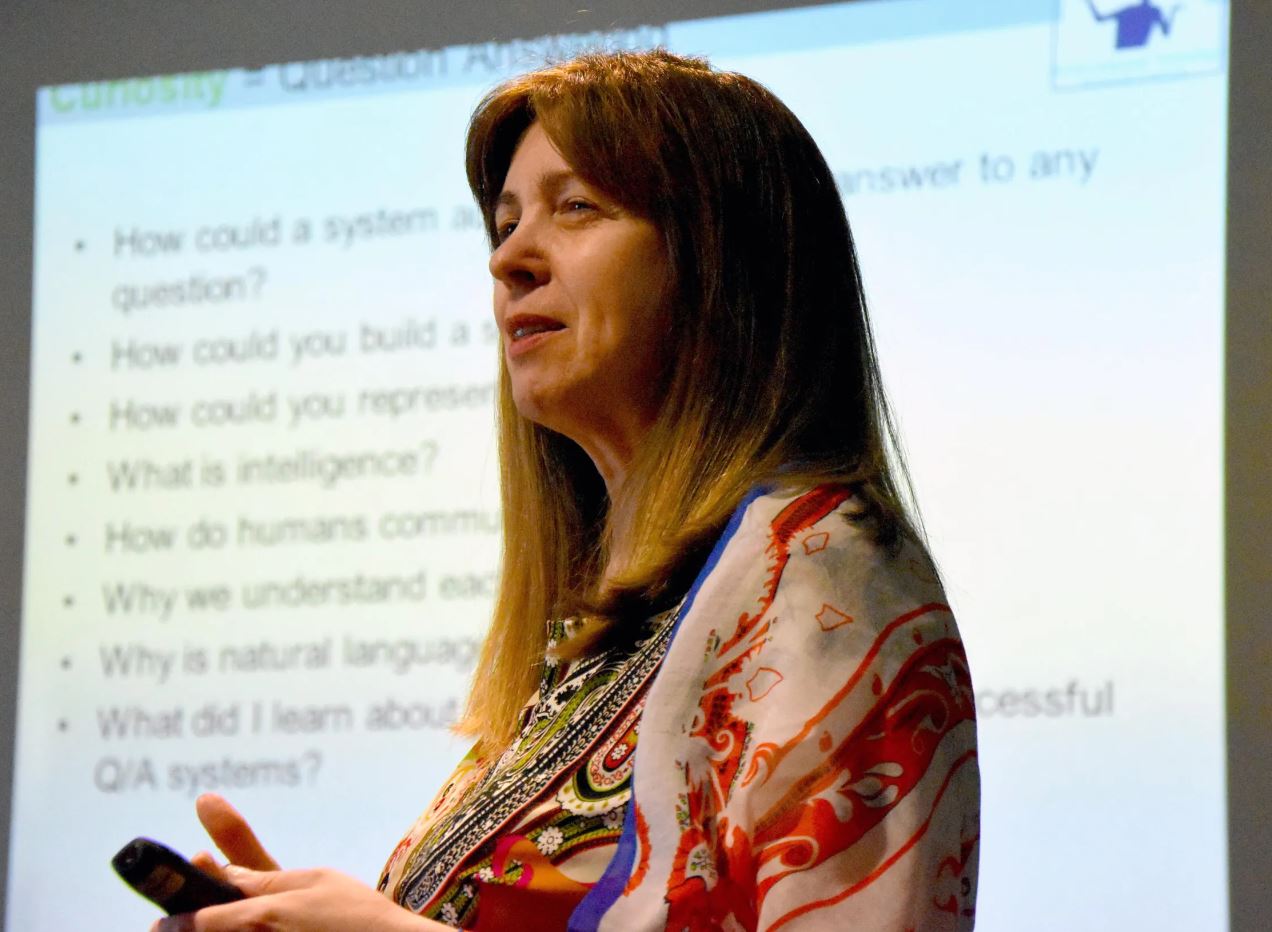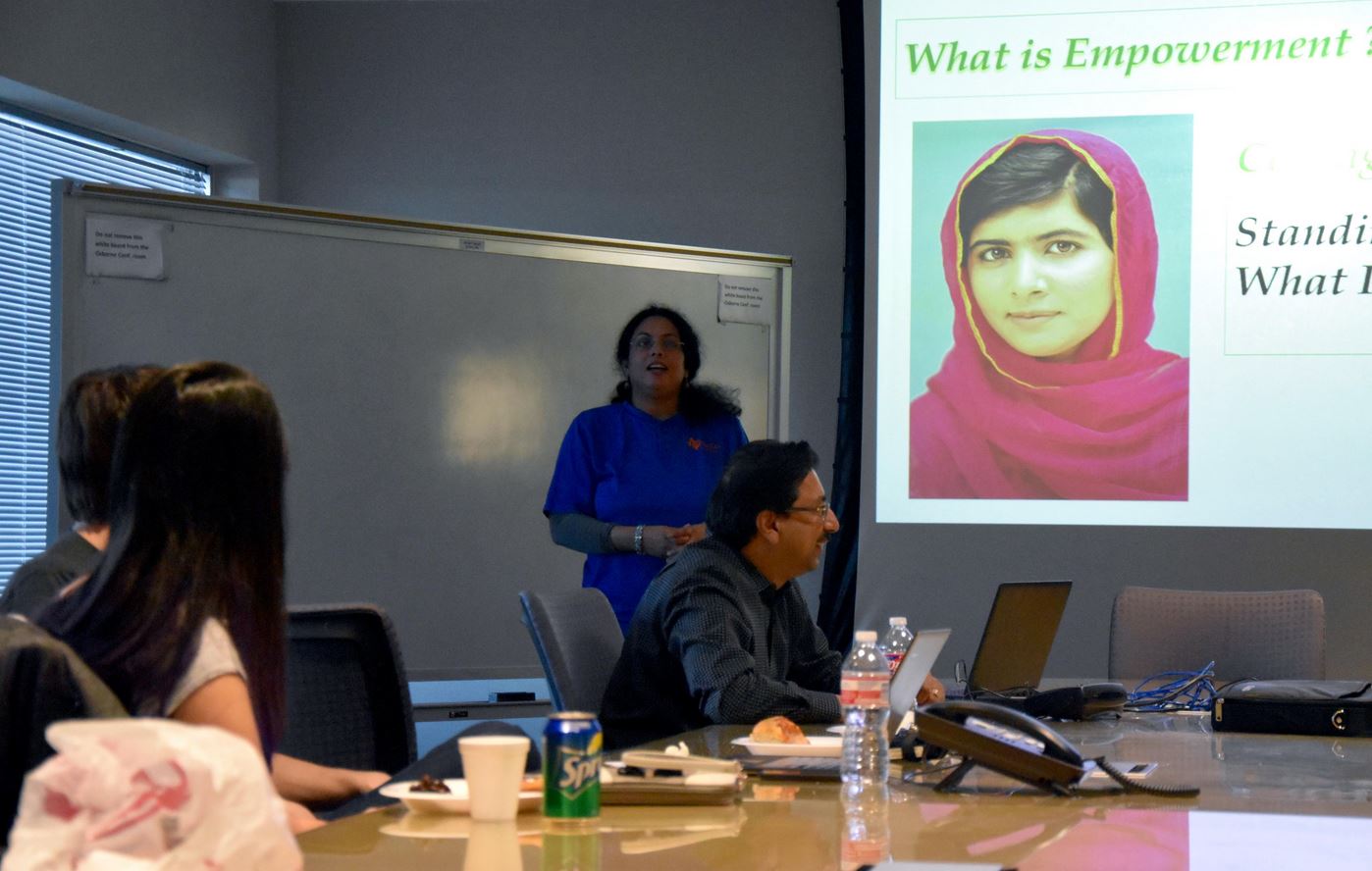Dr. Sanda Harabagiu Delivers the Last Grace Series Talk for the Spring 2016 Semester
On April 4th, the Grace Series ended its spring 2016 talks with Dr. Sanda Harabagiu, a Professor of Computer Science at UT Dallas, the Erik Jonsson School Research Initiation Chair, and the Director of the Human Language Technology Institute at UT Dallas. The Grace Series talks deliver insight into the role of women in today’s technology fields by having female technologists provide technical presentations. The talks aim to provide inspiration and a sense of community for female graduate and undergraduate students studying computer science and software engineering at UT Dallas. The final talk of this spring’s Grace Series attracted many of UT Dallas’ male and female computer science and software engineering students.
The Grace Series features talks by the UT Dallas Computer Science faculy, UT Dallas CS alumni, and other distinguished female technologists. Drs. Pushpa Kumar, Janell Straach, and Linda Morales conceived the idea of the UT Dallas Grace Series while attending the Grace Hopper Celebration of Women in Computing (GHC) Conference a few years ago. The conference, fittingly named after the woman who helped pioneer computer programming, Rear Admiral Dr. Grace Murray Hopper, involves a series of presentations designed to bring research and career interests of women in computing to the forefront. Every year, GHC brings together the community of women technologists, highlighting the best minds in computing and spotlighting the contributions of women to computing. The UT Dallas Computer Science Grace Series lectures are fashioned after the GHC Conference format.
Drs. Gopal Gupta and Pushpa Kumar provided the opening remarks for the evening talk before handing the floor over to Dr. Sanda Harabagiu. Dr. Harabagiu delivered the final Grace Series talk of the semester with her lecture titled, “What I learned About Research in the Digital Age.” In her talk, she described the problems that have fascinated her and informed her research over the past two decades, starting with Natural Language Processing (NLP) and ending with medical informatics. Dr. Harabagiu started her talk by addressing what she has learned from the semantics of Question-Answering Systems such as IBM Watson and continuing onto the many forms of knowledge that can be discerned from clinical documents such as Electronic Medical Record (EMR), which contain an abundance of information that can be expressed only via Natural Language. Dr. Harabagiu explained that the automated methods that can be used for extracting information from Electronic Medical Records by being able to recognize medical concepts in text, addressing lexical, syntactic, and semantic ambiguity. Additionally, she explained that to perform any form of automated reasoning on this type of information, the context of these concepts must be understood.
Dr. Harabagiu notes, “To enable medical informatics, we need to identify relations that span concepts mentioned in the EMRs. The ability to identify relations between medical problems, treatments, and tests typically result in improved quality of patient care.” Dr. Harabagiu also addressed the role of Big Data in Medical informatics and how it will become the “most important contribution to knowledge acquisition in Medicine.”
Dr. Harabagiu advised students who were interested in research by saying, “Imagination is a central force in research. So, if you would like to become a researcher, you must start looking at research creatively and artistically.”
Harabagiu is an expert in natural language processing, artificial intelligence, and information retrieval. She currently researches how human communication works in a textual form across different genres and domains, with a special interest in the medical domain. In her research, Dr. Harabagiu combines knowledge extracted from the World Wide Web with knowledge coerced from large lexical databases (e.g. WordNet or FrameNet) so that it is possible to model the semantics of language in texts.
Harabagiu holds doctorates from both the University of Southern California and the University of Rome. The recipient of a National Science Foundation Career Award, Harabagiu joined UT Dallas in 2002. She is also director of the Human Language Technology Research Institute, established in 2002. The Institute is home to several cross-disciplinary collaborations in the area of human language technology.
Below are news stories on past speakers from the Grace Series:
Dr. Bhavani Thuraisingham – April 2015
Dr. Lily (Wei Li) Wu – May 2015
Dr. Ranran Feng – December 2015
Dr. Jo Zhang – February 2016
ABOUT THE UT DALLAS COMPUTER SCIENCE DEPARTMENT
The UT Dallas Computer Science program is one of the largest Computer Science departments in the United States with over 1,600 bachelor’s-degree students, more than 1,100 master’s students, 160 PhD students, and 80 faculty members, as of Fall 2015. With The University of Texas at Dallas’ unique history of starting as a graduate institution first, the CS Department is built on a legacy of valuing innovative research and providing advanced training for software engineers and computer scientists.






